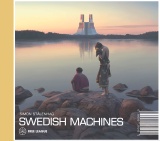When I saw the Kickstarter for Sunset at Zero Point[a], I almost reflexively pitched in. I think Simon is a gifted storyteller, and crowdfunded culture appeals to me. A bit later I realized that this would be queer SF about two gay boys growing up, which isn't my usual fare, but (a) the pledge was in and (b) I was curious about what Stålenhag would do with the premise.

Svenska Maskiner, Ensligt Belägna
Simon Stålenhag
ISBN: 9789189765795
Fria Ligan, 2025-05-21
Swedish and English
- Editions
- Sunset at Zero Point
English edition
ISBN: 9781668096413
Saga Press, 2025-12-09
- Sunset at Zero Point
A story where the science-fiction elements and illustrations for once take a back seat. A step outside Stålenhag's usual comfort zone - a bit clumsy here and there but comes out as overall excellent, just like the teens the book is about. (5/5)
Let's get the gay[1] out of the way: the story basically boils down a story about coming out of the closet and being much happier. There are some sections that are for 18+ audiences only, but I'd say nothing too explicit.
The science-fictional aspects of the story take a back seat this time, but as usual, the fictional world is an alternative '80s/'90s Sweden.[2] It is depicted in a wistful, nostalgic, and at times sad way. The environment of the restricted area does a lot of lifting: the wreckages littering it are reminders not so much of what was, but of what could have been; and the difficulty of navigating the non-euclidean geometry with its spatial and temporal labyrinth a parallel to the difficulty of a teenager trying to navigate his own sexuality[3] - a sexuality that is far from accepted by his peers and that he himself isn't willing or able to accept fully.
The book is said to be Stålenhag's most personal work so far, but it is impossible to say how much of it really is autobiographical. My guess is that the autobiographical part is the sense of alienation, perhaps best described by Stålenhag in his 2018 interview with Vice:
That never happens, and I think those characters… I don’t think they specifically symbolise adulthood, I think they symbolise conformity. People choosing to be somebody that they’re not. They think they’re acting in a certain way, because that’s what society expects from them, and they expect to get a reward for it, but the kids—I mean I’m not sure they see through it, but they react to it. They don’t like it, and I remember that’s how I felt being that age. I waited for that thing to happen. Adulthood.
— Vice: Exploring the Uncanny, Sci-Fi Dystopias of Simon Stålenhag[c]
I believe that the Swedish title of the book - Swedish Machines - is an allusion to this acting, because if you're remote controlled, then what are you, but a machine? Another parallel is to the Swedish "folkhem"-concept, where the state takes care of you from birth to death. You just have to follow the process - nice and comforting in theory, but suffocating in practice.
In Sunset at Zero Point the main character Linus ends up a closeted gay man who marries a woman, divorces, and ultimately learns to navigate the labyrinth near Zero Point to end up where he belongs, with Valter. It is easy to imagine a young Stålenhag growing up, going through his teenage years wondering what he'll become "when he grows up", only to actually reach adulthood and realizing that the answer is "none of the above - adulthood is not something that happens to you, it's what you make it". It is also easy to see the ending of Sunset at Zero Point as him finally taking that step into real adulthood.
The illustrations are the usual ones for Stålenhag. There are some really impressive ones, like the one of the zero point itself, but also many that by now have become cliches for those familiar with his work, and some that seem to be unrelated to the story but forced in there anyway.[4] The writing is the same - there are some very good lines, and some nice touches, but also a little chaff on the side. Part of this is maybe that Stålenhag has spent more than ten years exploring what it's like growing up in this '80s/'90s Swedish sci-fi dystopia, and we've reached and passed peak retro; but it could also be that the personal story he's trying to tell requires a treatment where it is allowed to be all over the place, just like real life tends to be. Overall, though, these imperfections don't distract from the general excellence of the book.